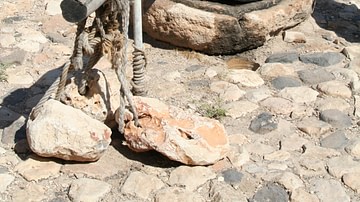Search
Search Results

Video
Gyotaku: The ancient Japanese art of printing fish - K. Erica Dodge
How did fishermen record their trophy catches before the invention of photography? In 19th century Japan, fishing boats were equipped with rice paper, sumi-e ink, and brushes in order to create gyoktaku: elaborate rubbings of freshly caught...

Definition
Protestant Reformation
The Protestant Reformation (1517-1648) refers to the widespread religious, cultural, and social upheaval of 16th-century Europe that broke the hold of the medieval Church, allowing for the development of personal interpretations of the Christian...

Article
Index of Prohibited Books
The Index of Prohibited Books (Index Librorum Prohibitorum) was a list of written works condemned as heretical or injurious to the Christian faith by the Catholic Church at the Council of Trent in 1563. It remained in effect until 1966 when...

Article
The Mummy's Curse: Tutankhamun's Tomb & the Modern-Day Media
Howard Carter's 1922 CE discovery of the tomb of Tutankhamun was world-wide news but, following fast upon it, the story of the mummy's curse (also known as The Curse of the Pharaoh) became even more popular and continues to be in the present...

Article
Ten Protestant Reformation Facts You Need to Know
The Protestant Reformation (1517-1648) was one of the most significant cultural, political, and religious events in the history of Europe and helped shape the modern world. It was a complex event spanning over 100 years, which radically changed...

Definition
Ancient Israelite Technology
Technology enabled ancient Israel, the Northern Kingdom excluding Judah, to be economically prosperous and establish itself as a major political power as early as the 10th century BCE, steadily growing until its destruction in 720 BCE. Some...

Definition
Benjamin Franklin
Benjamin Franklin (1706-1790) was an American printer, writer, scientist, inventor, and diplomat, often regarded as a Founding Father of the United States. He rose to prominence as editor of The Pennsylvania Gazette and author of Poor Richard's...

Definition
Mary Cassatt
Mary Cassatt (1844-1926) was an American impressionist painter who lived most of her life in France. She focussed on capturing women at their daily tasks in oils, pastels, and prints, and produced many innovative representations of mothers...

Article
Twelve Greatest Illuminated Manuscripts
Illuminated manuscripts are, as their name suggests, hand-made books illumined by gold and silver ink. They were produced in Western Europe between c. 500 and c. 1600 CE and their subject matter is usually Christian scripture, practice, and...

Definition
William Brewster
William Brewster (l. 1568-1644 CE) was an elder of the Leiden congregation of separatists (later known as pilgrims) and their spiritual leader while onboard the Mayflower and later after the establishment of the Plymouth Colony. The pastor...